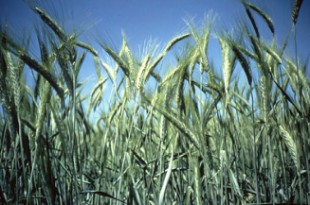 Warmer conditions in the last two weeks of May helped alleviate some of the wet conditions that were plaguing French wheat crops following a rainy growing season, but returning showers in the final days of the month renewed concerns about the French grain crop. French farm office, FranceAgriMer, says domestic wheat conditions remain at four-year lows with some 63% of the country’s soft wheat currently rated as good or excellent versus 93% with the same rating one year ago (and down slightly from the 64% recorded one week ago). The good-to-excellent rating for French durum wheat was 64% (compared to 66% for the same a week earlier).
Warmer conditions in the last two weeks of May helped alleviate some of the wet conditions that were plaguing French wheat crops following a rainy growing season, but returning showers in the final days of the month renewed concerns about the French grain crop. French farm office, FranceAgriMer, says domestic wheat conditions remain at four-year lows with some 63% of the country’s soft wheat currently rated as good or excellent versus 93% with the same rating one year ago (and down slightly from the 64% recorded one week ago). The good-to-excellent rating for French durum wheat was 64% (compared to 66% for the same a week earlier).
June has seen a notable uptick in urea prices across Europe and northern Africa with suspended operations in Egypt adding bullish factors to the UKC-Med spot markets. Futures for July 2024 ex-Black Sea have climbed to US$ 300/mt FOB (basis prilled bulk) from current levels of US$ 270-290/mt FOB. Similar prices for prilled bulk urea have also been registered at producers in the Baltic. Analysts say spot prices have rallied so much that some forecasts have July prices ex-Egypt at US$ 350/mt FOB. In the Middle East, suppliers are already charging up to US$ 315/mt FOB. Strong sales to the Baltic and Turkey are prompting the surge, but traders say that prices could also very well normalize by the end of the month when supplies return to equilibrium.
Expected volumes of European rapeseed production for 2024 have been reduced by the EU’s agriculture agency, MARS. Due to a combination of wet conditions in Eastern Europe (as well as in Denmark and northern Italy), waterlogging, pest pressure and sowing delays, the agency reduced its forecast for EU rapeseed this year to 3.21 mt/ha from last month’s forecast of 3.26 mt/ha. Consultancy Strategie Grains also lowered its forecast for EU rapeseed output in 2024 by 180,000mt to 17.94 Mt for similar reasons as well as frost conditions in central Europe. These adverse crop conditions, said the consultancy, were worse in France than in Germany. This would be roughly 10% lower than last year’s rapeseed crop and likely lead to a tighter balance between stocks and demand in 2025, prompting imports from countries such as Australia and Ukraine. The EU is the world’s largest rapeseed producer with an estimated 20.0 Mt produced in the last 12 months (against global output of 33.4 Mt over the same period). France and Germany are the EU’s two leading rapeseed producers, each with an average annual output of 4.5 Mt.
For exclusive news and updates about dry bulk shipbroking, subscribe to the BMTI Daily Report.

